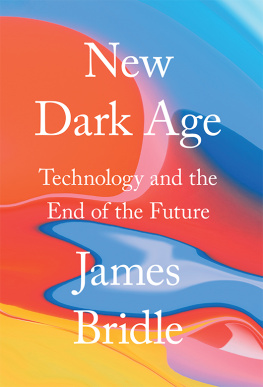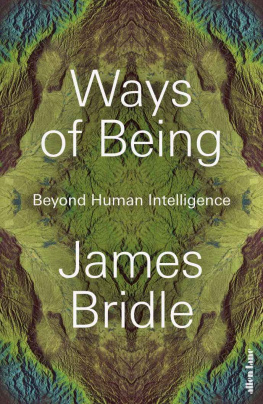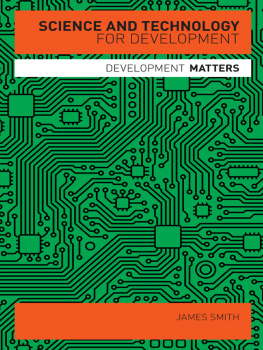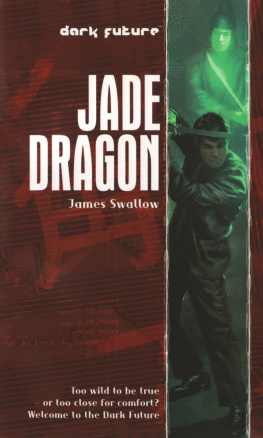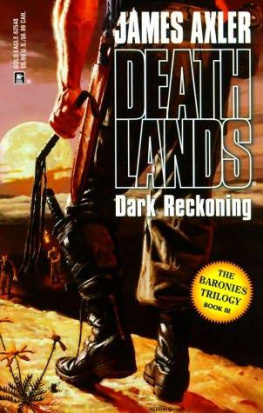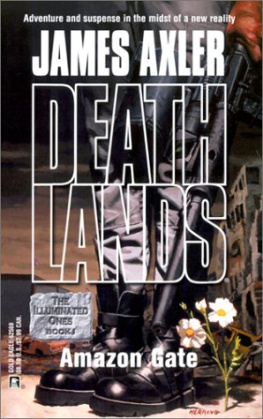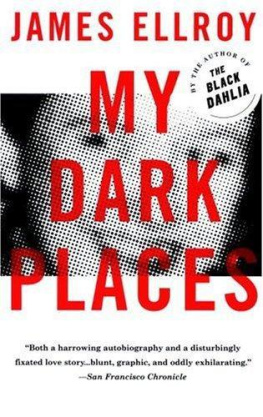James Bridle - New Dark Age - Technology and the End of the Future
Here you can read online James Bridle - New Dark Age - Technology and the End of the Future full text of the book (entire story) in english for free. Download pdf and epub, get meaning, cover and reviews about this ebook. year: 0, publisher: Verso Books, genre: Romance novel. Description of the work, (preface) as well as reviews are available. Best literature library LitArk.com created for fans of good reading and offers a wide selection of genres:
Romance novel
Science fiction
Adventure
Detective
Science
History
Home and family
Prose
Art
Politics
Computer
Non-fiction
Religion
Business
Children
Humor
Choose a favorite category and find really read worthwhile books. Enjoy immersion in the world of imagination, feel the emotions of the characters or learn something new for yourself, make an fascinating discovery.
- Book:New Dark Age - Technology and the End of the Future
- Author:
- Publisher:Verso Books
- Genre:
- Year:0
- Rating:4 / 5
- Favourites:Add to favourites
- Your mark:
- 80
- 1
- 2
- 3
- 4
- 5
New Dark Age - Technology and the End of the Future: summary, description and annotation
We offer to read an annotation, description, summary or preface (depends on what the author of the book "New Dark Age - Technology and the End of the Future" wrote himself). If you haven't found the necessary information about the book — write in the comments, we will try to find it.
New Dark Age - Technology and the End of the Future — read online for free the complete book (whole text) full work
Below is the text of the book, divided by pages. System saving the place of the last page read, allows you to conveniently read the book "New Dark Age - Technology and the End of the Future" online for free, without having to search again every time where you left off. Put a bookmark, and you can go to the page where you finished reading at any time.
Font size:
Interval:
Bookmark:

New Dark Age
and the End of the Future

First published by Verso 2018
James Bridle 2018
All rights reserved
The moral rights of the author have been asserted
1 3 5 7 9 10 8 6 4 2
Verso
UK: 6 Meard Street, London W1F 0EG
US: 20 Jay Street, Suite 1010, Brooklyn, NY 11201
versobooks.com
Verso is the imprint of New Left Books
ISBN-13: 978-1-78663-547-1
ISBN-13: 978-1-78663-549-5 (UK EBK)
ISBN-13: 978-1-78663-550-1 (US EBK)
British Library Cataloguing in Publication Data
A catalogue record for this book is
available from the British Library
Library of Congress Cataloging-in-Publication Data
A catalog record for this book is available
from the Library of Congress
Typeset in Sabon by Biblichor Ltd, Edinburgh
Printed and bound by CPI Group (UK) Ltd, Croydon, CR0 4YY
For Navine
If only technology could invent some way of getting in touch with you in an emergency, said my computer, repeatedly.
Following the 2016 US election result, along with several other people I know and perhaps prompted by the hive mind of social media, I started re-watching The West Wing: an exercise in hopeless nostalgia. It didnt help, but I got into the habit, when alone, of watching an episode or two in the evenings, after work, or on planes. After reading the latest apocalyptic research papers on climate change, total surveillance, and the uncertainties of the global political situation, a little neoliberal chamber play from the noughties wasnt the worst thing to sink into. One night I am halfway through an episode from the third series, and President Bartletts chief of staff, Leo McGarry, is regretting attending an AA meeting and as a result missing the early stages of an emergency.
What would you have done a half hour ago that hasnt already been done? asks the president.
Id have known a half hour ago what I know now, replies McGarry. This is exactly why Im not going to my meeting anymore its a luxury.
Bartlett circles McGarry, teasing him: I know. If only technology could invent some way to get in touch with you in an emergency! Some sort of telephonic device with a personalised number we could call to let you know that we needed you he reaches into Leos pocket and pulls out his phone Perhaps it would look something like this, Mr Moto!
Except the episode didnt get that far. The image on the screen continued to change, but my laptop had crashed, and one sentence of the audio looped over and over: If only technology could invent some way to get in touch with you in an emergency! If only technology could invent some way to get in touch with you in an emergency! If only technology could invent some way to get in touch with you in an emergency!
This is a book about what technology is trying to tell us in an emergency. It is also a book about what we know, how we know, and what we cannot know.
Over the last century, technological acceleration has transformed our planet, our societies, and ourselves, but it has failed to transform our understanding of these things. The reasons for this are complex, and the answers are complex too, not least because we ourselves are utterly enmeshed in technological systems, which shape in turn how we act and how we think. We cannot stand outside them; we cannot think without them.
Our technologies are complicit in the greatest challenges we face today: an out-of-control economic system that immiserates many and continues to widen the gap between rich and poor; the collapse of political and societal consensus across the globe resulting in increasing nationalisms, social divisions, ethnic conflicts and shadow wars; and a warming climate, which existentially threatens us all.
Across the sciences and society, in politics and education, in warfare and commerce, new technologies do not merely augment our abilities, but actively shape and direct them, for better and for worse. It is increasingly necessary to be able to think new technologies in different ways, and to be critical of them, in order to meaningfully participate in that shaping and directing. If we do not understand how complex technologies function, how systems of technologies interconnect, and how systems of systems interact, then we are powerless within them, and their potential is more easily captured by selfish elites and inhuman corporations. Precisely because these technologies interact with one another in unexpected and often-strange ways, and because we are completely entangled with them, this understanding cannot be limited to the practicalities of how things work: it must be extended to how things came to be, and how they continue to function in the world in ways that are often invisible and interwoven. What is required is not understanding, but literacy.
True literacy in systems consists of much more than simple understanding, and might be understood and practised in multiple ways. It goes beyond a systems functional use to comprehend its context and consequences. It refuses to see the application of any one system as a cure-all, insisting upon the interrelationships of systems and the inherent limitations of any single solution. It is fluent not only in the language of a system, but in its metalanguage the language it uses to talk about itself and to interact with other systems and is sensitive to the limitations and the potential uses and abuses of that metalanguage. It is, crucially, capable of both performing and responding to critique.
One of the arguments often made in response to weak public understanding of technology is a call to increase technological education in its simplest formulation, to learn to code. Such a call is made frequently by politicians, technologists, pundits and business leaders, and it is often advanced in nakedly functional and pro-market terms: the information economy needs more programmers, and young people need jobs in the future. This is a good start, but learning to code is not enough, just as learning to plumb a sink is not enough to understand the complex interactions between water tables, political geography, ageing infrastructure, and social policy that define, shape and produce actual life support systems in society. A simply functional understanding of systems is insufficient; one needs to be able to think about histories and consequences too. Where did these systems come from, who designed them and what for, and which of these intentions still lurk within them today?
The second danger of a purely functional understanding of technology is what I call computational thinking. Computational thinking is an extension of what others have called solutionism: the belief that any given problem can be solved by the application of computation. Whatever the practical or social problem we face, there is an app for it. But solutionism is insufficient too; this is one of the things that our technology is trying to tell us. Beyond this error, computational thinking supposes often at an unconscious level that the world really is like the solutionists propose. It internalises solutionism to the degree that it is impossible to think or articulate the world in terms that are not computable. Computational thinking is predominant in the world today, driving the worst trends in our societies and interactions, and must be opposed by a real systemic literacy. If philosophy is that fraction of human thought dealing with that which cannot be explained by the sciences, then systemic literacy is the thinking that deals with a world that is not computable, while acknowledging that it is irrevocably shaped and informed by computation.
Font size:
Interval:
Bookmark:
Similar books «New Dark Age - Technology and the End of the Future»
Look at similar books to New Dark Age - Technology and the End of the Future. We have selected literature similar in name and meaning in the hope of providing readers with more options to find new, interesting, not yet read works.
Discussion, reviews of the book New Dark Age - Technology and the End of the Future and just readers' own opinions. Leave your comments, write what you think about the work, its meaning or the main characters. Specify what exactly you liked and what you didn't like, and why you think so.

